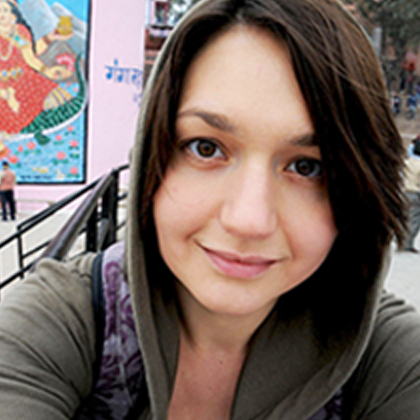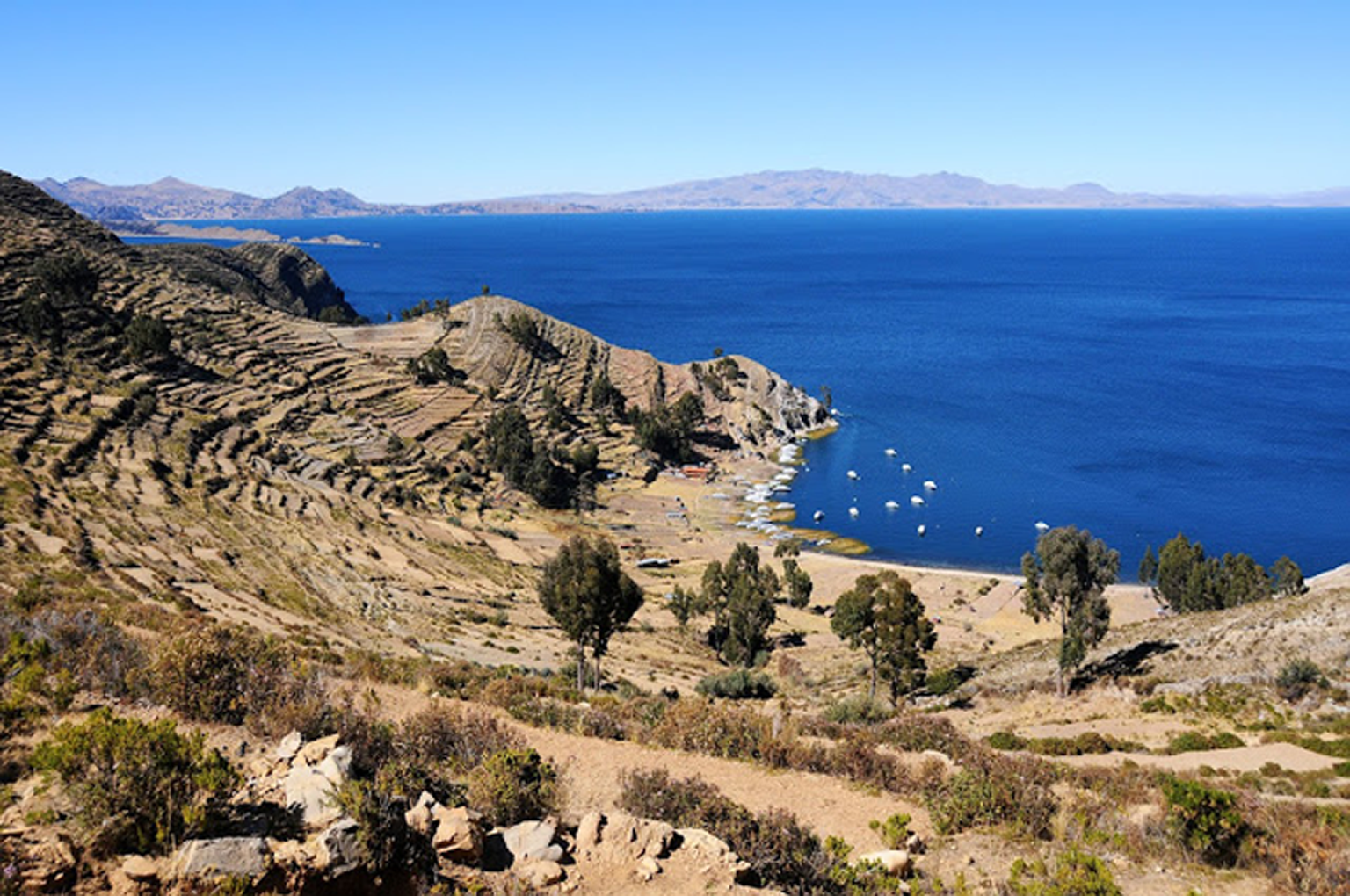- Posted by:
- anjci
- Under:
- Travel: Eastern Europe
One sunny morning in August, I find myself on a plane to Moscow – my first holiday in Russia in over 30 years.
I have only once before visited Russia for any significant time, as young child in the late 1980s when it was still part of the Soviet Union. Despite having few memories of my early childhood, I have carried vivid recollections from that trip through my life. I remembered the unpaved streets of my mother’s home village of Urshel, overgrown ditches stretching along their sides past log houses with colourful window frames and shutters, already then in various states of disrepair. A massive glass factory – the local attraction of sorts – rose abruptly at the end of the main street, its machinery filling the air with a continuous hum. I swam in sand quarries filled with muddy water, side by side with cows quenching their thirst. Life could not have been more innocent and care-free.
In the years that followed, my trips to Russia – now a border crossing away – were rare. The most memorable was a rushed jaunt to St. Petersburg in 2001, just before graduating from high school. Having been informed by a crew agent that my father – a merchant seaman – was nearing the city, my mother and I set off by train, excited about the imminent encounter after not having seen him for months. We overnighted at a grubby hostel near the port that we strongly suspected was a sailors’ brothel before the agent got in touch with bad news: my father was, in fact, still several days away. Our train back to Riga delayed, I burst into my Latvian language exam looking like I had spent the night outdoors and was nearly refused entry. I ended up getting an A, but even failing the exam would have been worth the excitement of that short trip.
Gorgeous Vladimir City: Russia’s former capital and one of my earliest memories of Russia
My subsequent trips to Russia were nowhere near as fun. I started my first full-time job at UBS in London in 2006 and, as the only Russian speaker in their energy team, travelled to Moscow and St. Petersburg relatively frequently. Unfortunately, as often happens to junior employees, all those trips were spent in increasingly dull meetings and never lasted longer than a day. The excitement of business travel wore off quickly, leaving those trips to Russia more of a nuisance than anything else.
NO STRANGER TO RUSSIA
As I watch Russia come into focus through the plane window, I realise I don’t really know the country. My only proper trip to Russia was over 30 years ago, and, despite my scratch map back in London showing the entire Russian territory scratched off – my arm ached for days afterwards – I have never ventured anywhere east of the city of Vladimir, just a short distance east of Moscow. I have set foot in but a fraction of the vastness of Russia, the largest country in the world.
But I am no stranger to Russia: I am, after all, a Latvian of Russian and Lithuanian descent. My Russian mother never disconnected from her country of birth and my Lithuanian father, orphaned as a newborn, was raised as a native Russian speaker. My ethnic background means that I have had more cultural exposure to Russia than any other country besides Latvia and my adopted home, the UK.
The environment in my parental home is predominantly monocultural: Russian politics are followed with interest and Russian athletes fiercely supported in international events. If the television is not showing Russian-language news, my mother is probably watching another Russian sitcom or talk show. Russian media is saturated with references to the country’s Soviet past that I do not always understand having been raised in mostly independent Latvia, and I often cannot relate to everything being discussed. Helpfully, my father and I have a tradition to watch classic Soviet films together when I visit home, in which I query the peculiarities of life in those days and get to hear the various catchy phrases familiar to most Russians of the era. Dad also sends me a Russian anecdote every day reflecting the typically Russian psyche – admittedly, some of them would be considered outrageously politically incorrect in the West, but they do help me better understand the country of one portion of my ancestors.
Whatever the ‘typical Russian psyche’ is given how diverse Russia is – here is an image of Buryat girls dancing
It is fair to say that I was raised in a Russian bubble whilst physically living in Latvia. I lived in a district predominantly Russian in ethnicity, went to a Russophone school and had minimal exposure to ethnic Latvians far into my teenage years. This was not unusual for Russian-speaking residents in Latvia – the country’s largest ethnic minority group – in the 1990s, when the two communities mixed significantly less than they do now. I still feel more comfortable in the company of fellow Russian speakers from across the former Soviet Union than any other group.
URSHEL, MY MOTHER’S BIRTH PLACE
Despite this overwhelming exposure to all things Russian, the thought of an extended trip to Russia actually scares me. Possibly it’s the country’s sheer size – not in a single country before have I needed to book a 6-hour domestic flight to land still thousands of kilometres from the other end, or the underlying fear that, somehow, the country that I have such vast knowledge of – all theoretical, of course – will surprise me by turning out to be something completely different.
My fears are quickly put to rest. I am amazed how correctly I remember Urshel and how little it has changed. The same old glass factory still dominates the landscape, humming in the background with the same industrial melody as decades ago. Established in 1858, the factory made its name in the Soviet Union thanks to its iconic beer glasses that once filled many bars in the country and are now a collector’s item. Also known for a variety of other products before the Soviet Union collapsed, the factory now works intermittently and manufactures limited-range glass bottles on order. Its partial survival is most certainly the reason the village still exists.
Roll credits – the very glass factory in question
Some things in Urshel look much better than before. A large social club with modern sports and playground facilities has been built on funds generously donated by a former villager who has grown to become wealthy, their philanthropy extending further to the refurbishment of the village hospital to prevent its imminent closure. The single empty-shelved ‘univermag’ typical of the past has given way to two modern, chain supermarkets, and there is now somewhere for villagers to eat and drink out: a café-bar called Maris adjacent to the glass factory.
The rest of Urshel has suffered visibly in the 30 years since my last visit: the still-unpaved streets are lined with ditches noticeably more overgrown than before, and many of the log houses haven’t been maintained and look to be on the verge of collapse. Passenger traffic on Urshel’s only railway link, a branch-line to Cherusti on one of the legs of the Trans-Siberian Railway, ceased in 2007 and the local train station stands abandoned – another stark reminder that the local population has been in decline for decades.
The better looking buildings on the main street of Urshel
FAMILY I HALF-FORGOTTEN I HAD
But it is the extremely basic living conditions of my Urshel relatives that sadden me the most. Toilet facilities range from dilapidated wooden outhouses in the backyard – sometimes a significant distance away from the main house – to Soviet-built lavatories that haven’t once been repaired. Most houses in the village still rely on wood-burning stoves for heating, gas canisters for cooking and wells for water. As part of the brick Khrushchyovka apartment blocks built for skilled workers of the glass factory, only my uncle Yevgeny’s flat has modern facilities including running water, an indoor toilet and central heating.
A creaky hut on the main street where my mother lived until the age of nine looks among those worst affected by age. Its entire façade tilts precariously to one side, and the fence leans out onto the street almost diagonally. Now only Nina, the wife of my late great uncle Nikolay, lives here, too old to repair the slowly crumbling structure by herself. Her son Oleg, her only help for many years, recently lost a long and painful battle with cancer. It is to the sauna shed in the backyard of this house that I come to every night for my daily wash with water drawn from a well and heated on the rocks – in the dark, as the wiring to the sauna’s sole light bulb broke some time ago.
Down at the water source with a bucket – going back to my roots with vengeance
One particular reunion stands out from the rest. My long-awaited visit to great-aunt Lida is nothing short of heart-breaking. Once a heavy alcoholic, she was tricked into gifting her flat in Vladimir to her granddaughter – her mother, Lida’s daughter, having died a few years before – who swiftly proceeded to evict Lida. Suffering a stroke while in a drunken stupor, she ended up in an institution for the mentally disabled ‘for two weeks only’. Six years later, Lida has recovered, no longer drinks and has developed significant clout with the other inhabitants of her unexpected residence. She helps nurses to look after other patients and enjoys certain privileges in return. Receiving her full pension every month, Lida is, at least in theory, free to leave. She longs to go home: tears roll down her cheeks as she asks, over and over, when her granddaughter’s new house – financed from the proceeds of Lida’s old flat – will be finished. But there are always excuses. Lida has nowhere to go.
Being in Urshel is a sobering experience yet not without its humorous side. Through my relatives’ stories, I discover things about myself, too. I have always thought I disliked vodka, but, after days spent visiting family members and friends where the drink seems to be mandatory, I take a liking to it. I am greatly entertained to discover that my late great uncle Nikolay’s nickname was ‘Stierlitz’ – after a fictional Soviet spy beloved by my father – because he had served in East Germany. And I am floored to learn that my own surname is pronounced differently by the villagers. English speakers tend to stress the fourth syllable, the –drO-, which I have spent years correcting: I always considered stressing the third syllable the only acceptable way. However, to my great amazement, the Urshelites decidedly side with the English here, and I may have been mispronouncing my own surname my whole life.
My wonderful great-aunt Lida near her bed
DEEPER INTO RUSSIA
The rest of my journey through Russia goes by in a flash. Urshel seems like a distant memory when, looking out of another plane window, all I see below is an uninterrupted stretch of forest. I am about to land in Irkutsk, four thousand kilometres east of Urshel (yet still a staggering two thousand kilometres from the nearest coast to the east), on my first foray into Siberia and by far the farthest I have ever ventured into Russia. Whilst I find it increasingly hard to feel impressed in my travels these days – so many places remind me of so many others and so few seem unique – this mass of green underneath steals my breath away almost instantly.
Irkutsk is a well-known gateway to Baikal, the world’s deepest lake and a sight that I have wanted to see for as long as I can remember. I spend three days on Olkhon, Baikal’s largest island and a popular tourist destination. The island’s main settlement of Khuzhir is within walking distance of Shamanka Rock, a local landmark and sacred place where I wander down every evening to watch the sun set over the Baikal. I also hop on one of the many identical UAZ minibuses on an excursion to Olkhon’s northernmost cape, the Khoboy, and exhaust myself to tears cycling around parts of the island not covered by group tours. Despite the horrific state of most local roads and Khuzhir’s prevailing melancholic mood at the end of the tourist season, Baikal’s simple beauty astonishes me.
And astonishes me. And astonishes me.
Back in Irkutsk, I embark on my first ever Trans-Siberian journey, a relatively short ride of ‘only’ nine hours, of which the train circles around Baikal for around half – my chance to say goodbye. Even covered in low-hanging cloud on a rainy day, the lake looks spectacular. So vast is the horizon that it is hard to believe that, in front of me, there is indeed a lake – it is no wonder that Baikal is commonly referred to as a ‘sea’ locally.
Arriving in Ulan-Ude in the Buryatia region, I am incredibly lucky – and entertained – to run into mass rehearsals for the city’s anniversary festivities. The theme is the four seasons, and the dancer portraying spring seems to be reliably missing her entry while ‘summer’ fails to arrive at all, making their entourage repeat the entire sequence starting from autumn over and over again – ironically, not in dissonance with the rest of the country. This surreal scene is completed by a policewoman pushing a Christmas tree as a prop for spring as Lenin looks on in silent approval. Besides its position as a centre of Buddhism in Russia, Ulan-Ude is best known for housing this monstrosity, the world’s largest head sculpture of Lenin.
He sees it all… he is the largest head in the world
I can end my detour into Siberia here, but, with a spare day left, I venture out to the next major stop on the Trans-Siberian. Some 600 kilometres, a time zone and an overnight train ride later, I am walking on the streets of Chita, a city famous for… not exactly much. Chita is a major rail hub as well as the exile place for many Decembrists after their revolt in 1825, still manifested in streets named after them across the entire Zabaykalsky Krai. But there is not much to see in Chita as far as typical tourist attractions go, and locals are surprised to hear I am not here on business: to my question what trips one can take from Chita, one young gentleman shrugs and responds simply ‘China’.
My journey in Russia ends where it started – the glitzy and buzzing Moscow. I land in the middle of the capital’s 872nd birthday festivities and am overwhelmed by the masses of people everywhere. Seeing this many people at any one time in London, and especially in Riga, would mean a major musical or sporting event taking place nearby – but, in Moscow, this simply means a weekend. I don’t remember much of Moscow from my previous visits, but I cannot help noticing how much more polished and gentrified the city is compared to where I had just flown in from. It is remarkable how noticeably the urban scenery in Russia changes the further you go from a wealthy regional centre and, especially, the capital.
I have got to insert my favourite bit of Moscow here, the one involving THAT fountain at VDHKh
A FOREIGNER IN RUSSIA…
Before returning to London, I ask myself if, given my lifelong connections to Russia, I have felt at home here.
The honest answer is no. During the past two weeks I was constantly reminded that I am a foreigner in Russia. A passport is the only ID trusted here, and I have endured passport checks almost daily, whether checking into a hotel, boarding a long-distance train or buying an alcoholic drink. On many occasions I observed people raising their eyebrows seeing my Latvian passport as, hearing fluent Russian, nobody expected to be presented with a foreign document. Living in London, I am not used to Latvia being considered in any way exotic, but, in the depths of Russia, it was perceived almost as another planet. Some people I have met lamented about not being able to revisit the Baltic region having gone only once, decades ago.
Not familiar with modern Russian slang, I have also struggled to understand the youth here. Many people my age probably have problems understanding local youngsters too, but some of those once-niche words and expressions have mysteriously made their way into mainstream use in Russia. They are not impossible to decipher, tending to be either abbreviations of regular Russian words such as ‘chel’ (chelovek = person) or ‘zhiza’ (zhiznenno = true), or loaned from English such as ‘tresh’ (bad outcome = trash) or ‘soryan’ (sorry). Still, I find myself confused on more than one occasion. Life has clearly become too rushed to use words in their entirety, whilst the Internet has had the greatest influence on the evolution of the ‘cool’ English-derived speak in Russia.
They would likely be able to translate any jargon
Perhaps not unsurprisingly, I also have absolutely no idea about famous personalities in post-Soviet Russia. I haven’t recognised any songs released after the mid-1990s: my parents resent Russian pop of the last two decades and never linger on channels that play it. And I haven’t been able to participate in many discussions involving most present-day politicians, actors, athletes, TV presenters and the like – certainly much fewer than I would in Latvia or the UK.
…OR MORE OF A LOCAL?
At the same time, I have been able to relate to many more aspects of everyday life in Russia than almost anywhere else I have visited. I have recognised countless references to Russian popular culture of the Soviet era, familiar to me since childhood. Catchy one-liners and recurring characters from Soviet-era films and cartoons are fondly remembered and widely used in visual displays in Russia to this day. They likely mean nothing to a regular foreign tourist, even those who speak Russian, as they cannot be translated ad verbum – but hearing them makes me feel like I belong to a secret club of sorts. In Russia, I feel akin a well-trained spy: someone with a perfect command of not only the language but also the intricate details of the daily life. I have my father to thank for the hours spent together watching those old films and cartoons.
I am relieved by how incredibly easy it has been to travel in Russia. Most of my recent destinations were challenging in one way or another, even when I used help to organise my visit. Not speaking the local language, having to dress in a certain way, needing a guide’s help for the simplest conversations, enduring overwhelming attention from locals, relying on poor infrastructure, having stomach problems for the lack of hygiene, outright risking my life to visit somewhere dangerous – my trip to Russia featured none of that.
It did feature a lot of Soviet relics like this one though, Urshel’s star attraction in front of the glass factory
Unsurprisingly, it was likely Russian being my mother tongue that made my journey so flawlessly smooth. Immersing myself in my native language has been the single most amazing aspect of my visit to Russia. It is difficult to understand the importance of something so seemingly trivial unless you are part of an ethnic minority growing up in another country. I am used to seeing writings in a foreign language around wherever I go, and everywhere I have ever lived has been a foreign-language environment, no matter how well I spoke the local language.
By default, I never cease to be aware of the fact that I permanently operate in a foreign language ‘mode’ in public. I work at an international organisation in London and hear a wide spectrum of languages on a daily basis, most of which I do not have a fluent command of. During term time, I usually take one or more language courses, and it is sometimes tirying to be constantly corrected or told how what I said could be improved from a teacher’s perspective. My second language, Latvian, has become rusty through lack of use over time – a great source of shame as I once spoke it very well – and it takes me extra effort to speak it with any sort of fluency. Being surrounded by foreign languages exhausts the enthusiast in me that yearns to master every language to perfection.
Simple things like understanding this hotel’s name at one glance brought me the most joy
But, in Russia, I have felt relaxed. Not having to dwell on linguistic structures feels both humbling and a privilege – a true holiday for the mind. There is no need to group and regroup words in my head or constantly tell myself off when I could have expressed myself in a more elaborate way. I have particularly enjoyed seeing Russian used in a creative way rather than merely as an accompanying translation of a foreign text – something I have encountered for the first time in my life.
AND I HOPE TO BE BACK SOON
On my first day back at work, a colleague asks where in Russia I have returned from. Pointing out Urshel, I invite him to drag the map further east. He gives it two or three good rolls: other countries swoosh by but, as far as Russia goes, we aren’t even halfway to Irkutsk. Russia’s enormous scale may never cease to amaze me.
My short detour to Urshel was eye-opening. I was privileged to reconnect with the family I had half-forgotten I had and humbled to witness the poverty and hopelessness in which they live. My great-aunt Lida’s devastating life story continues to disturb me: what must it be like, if not horrifying, to spend days waiting for someone to take you away from a place you resent, for years on end? How does one feel never knowing when the members of their shrinking family will visit again, if ever?
Lida overjoyed to be reunited with her sister, my great-aunt Vera
Uncovering the Russian side of my heritage left me wondering what it would be like to learn more about my father’s roots. Born in early October – possibly an accident of a joyous New Year’s Eve – he was abandoned at a Vilnius orphanage at birth and grew up knowing nothing of his biological family. The only clue I have is the patronymic and surname retrieved from my father’s adoption documents, but those could have been made up. That isn’t much to go by. I may never get to know my father’s family.
For now though, I am planning a trip to Russia next year to see more of the family I know I have… and to visit Kamchatka, another of my long-standing dreams.












2020 Travel plan: Pastures new and old favourites | ANJCI ALL OVER says:
February 6, 2020 at 1:43 pm
[…] had a fantastic time exploring Russia last year. So good was my trip that, come September, I will be directing my steps back to the […]
Comments are closed.